International Conference on "Digital Economy and Public Governance" held by our University
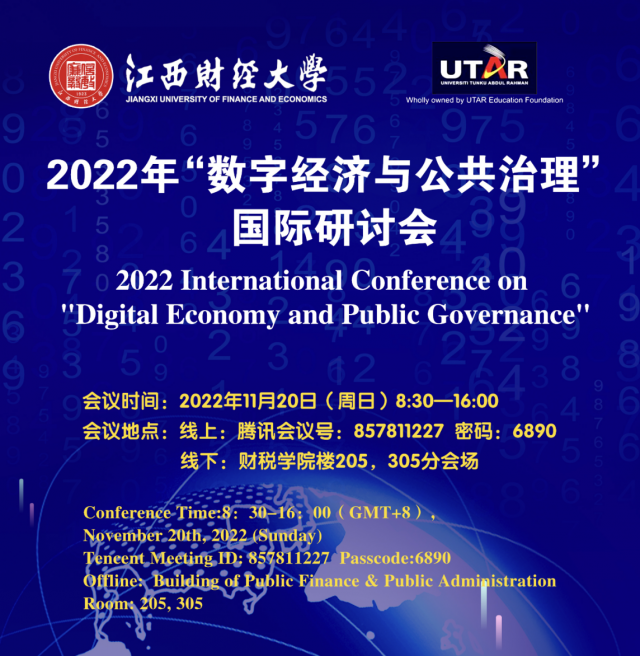
Jiangxi University of Finance and Economics held the International Conference on Digital Economy and Public Governance online on November 20th,2022. The conference was co-hosted by Universiti Tunku Abdul Rahman and organized by the School of Public Finance & Public Administration and Research Center of Finance and Taxation of Jiangxi University of Finance. The conference was held in the form of online + offline, including a total of 11 cutting-edge lectures. About 150 domestic and foreign teaching and research personnel, industry practitioners, master and doctoral students, and undergraduates attended the conference. The conference guests came from Universiti Tunku Abdul Rahman in Malaysia,The University of Auckland in New Zealand, The University of Malaya, The University of Sydney in Australia, The University of Western Ontario in Canada and other internationally renowned universities. The conference also invited scholars from UTAR and JUFE to host and make comments.
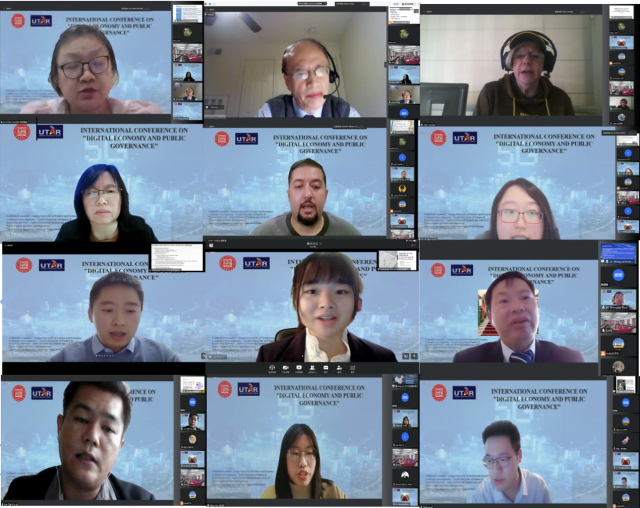
Professor Li Chungen, Vice President of our university, and Associate Professor Au Yong Hui Nee, Dean of the Faculty of Business and Management, Universiti Tunku Abdul Rahman in Malaysia, successively delivered speeches at the opening ceremony, which was presided over by Professor Zhang Zhongfang, Dean of the School of Public Finance and Public Administration.

Professor Li Chungen, on behalf of Jiangxi University of Finance and Economics, extended a warm welcome to the experts and scholars attending the conference, and introduced the history of Jiangxi University of Finance and Economics and the effectiveness of the School of Public Finance and Public Administration. He pointed out that the progress and widespread application of digital technology have driven the booming development of the digital economy, and the global economic governance has therefore entered a new historical era. From the perspective of governance object, digital technology has expanded the space of global economic governance, and has enriched the connotation of global industrial governance, trade governance, monetary and financial governance and sustainable development governance. At this meeting, he also put forward the beautiful vision of contributing wisdom and strength to digital international cooperation together with other universities and experts around the world. Dean Au Yong Hui Nee delivered a speech on behalf of Universiti Tunku Abdul Rahman, and she mentioned that the smooth convening of the international conference with the theme of Digital Economy and Public Governance had a profound impact on international digital cooperation, and also played an important role in promoting the reform and innovation of the global economic governance system. She hoped that all the experts and scholars can have the most cutting-edge and in-depth exchanges and discussions on the implementation of global public governance policies under the background of digital economy, and introduced the history and effectiveness of Universiti Tunku Abdul Rahman in Malaysia.
After the opening ceremony, the keynote speech started, presided over by Associate Professor Wan Yina of Jiangxi University of Finance and Economics. Dean Au Yong Hui Nee delivered a keynote speech on Seizing the Benefits of the Digital Economy and Cross-Border Trade: Government Intervention for Digital Transformation of Small and Medium Enterprises in Malaysia. She pointed out the opportunities that the digital economy brings for trade, and pointed out the need for a state-led and effective business ecosystem in the digital transformation. At the end, the policy strategy of digital transformation was proposed, involving access to finance, market access, human capital development, tax regime, infrastructure and technology adoption, legal and regulatory environment, monetary policy and other aspects.
Zhao Wenyi, a Senior Research Scientist at Jacobus Pharmaceutical Company, delivered a keynote speech titled Digitalization of Pharmaceutical Industry. He noted that the pharmaceutical industry is one of the fastest-growing sectors of the economy and is now facing the huge challenges associated with high risks and high costs. By increasing the use of robotics, automation solutions, and computerization, the digitalization of the pharmaceutical industry, including the contract development and Manufacturing Organization (CDMO), improves drug discovery efficiency and reduces production costs.
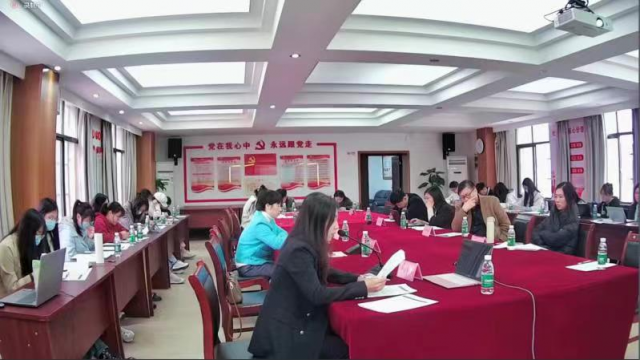
Professor Cassidy Julie at the University of Auckland in New Zealand delivered a keynote speech titled Digital Economy and Public Governance: Regulatory Framework for Cryptocurrencies. She first took bitcoin as the entry point, summarized the three characteristics of cryptocurrency, namely electronic, cryptography, non-government issuance, and finally elaborated the development of cryptocurrency in Japan, China, New Zealand countries, as well as the tax policies on cryptocurrency electronic currency.
Professor Xi Weiqun of Jiangxi University of Finance and Economics delivered a keynote speech entitled Tax Contribution and Policy Support of Digital Industrialization in China. She pointed out that the in-depth development of digital industrialization can promote the growth of tax revenue and have a significant traction effect on tax contribution. The following suggestions were put forward: Increase tax support for telecommunications,radio,television and satellite transmission services, the Internet and related services, and increase their tax contributions; Increase tax support, encourage digital industrialization development, narrow the digital divide; Improve the preferential policies of corporate income tax and improve the traction effect of digital industrialization development on income tax; Accelerate the reform of tax collection and management, realize digital taxation, and reduce tax loss.
Engineer Khaled Nedal Mahmod Sobh at the University of Malaya delivered a keynote speech titled Development of a New Low Cost Wearable Cuff System for Prosthetic Interface. He introduced a new and wearable prosthetic interface cuff system, and experimented with 10 non-amputees and two transtibial amputees.
Dr. Xi Nan, from the University of Sydney in Australia, delivered a keynote speech titled Detection of Tax Evasion Activities on Social Media Platforms: Insights from an Experiment on Instagram and Its Regtech Tool. She pointed out that social platforms, as private sharing platforms, are not regulated by tax authorities, and that transactions on social platforms are considered invisible transactions without tax payment, and introduced a machine learning-based regulatory technology tool for ITO to detect transaction-based tax evasion in social e-commerce.
Zheng Jiaxing, a lecturer from Zhejiang University of Finance and Economics, and Xie Tianyuan, a student from The University of Western Ontario, delivered a keynote speech titled Research on the Multilateral Instrument and Its Practice in China. They described the importance of multilateral instrument from their characteristics, its relationship with covering tax agreements, the advantages and disadvantages of multilateral instrument, and China's experience in ratifying multilateral instrument.
Assistant professor Wong Lai Soon and Lecturer Lee Chin Yu of Universiti Tunku Abdul Rahman, Liu Miao from Jiangxi University of Finance and Economics, Zhao Jun from the University of Sydney in Australia Successively to deliver presentations to Parents’ Acceptance of Online Learning by Gen Z students During Covid-19 Pandemic in Malaysia, The Role of Digital Economy on Economic Growth, Risk and protective factors for aggression:A descriptive study among juvenile delinquents in China, Date Governance Issues from Digital Disruption in the Hospitality Industry as the theme of a keynote speech.
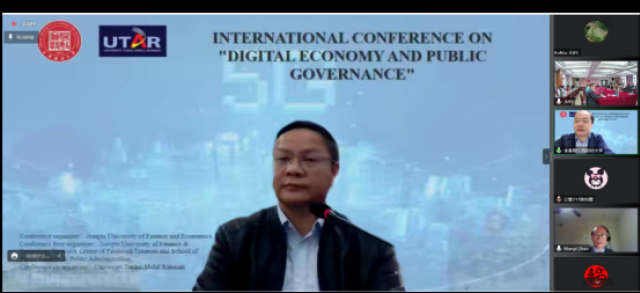
After the keynote speech, the closing ceremony of the conference was held, and Professor Zhang Zhongfang, Dean of the School of Public Finance and Public Administration, delivered a closing speech. He pointed out that the digital economy is becoming a key force to restructure global factors and resources, reshaping the global economic structure and changing the global competition pattern. This international conference is a positive response to Strengthening international cooperation in digital economy and promoting the reform of global digital governance. And hoped that more experts and scholars can continue to explore the research of digital economy and make more contributions to the international cooperation in digital economy in the future.
This conference is a high-level academic feast jointly created by experts and scholars around the world, which is conducive to further promoting the double first-class discipline construction of our university, improving the scientific research level of our university, expanding the international vision of teachers and students, and expanding the influence of our university in the domestic and international academic circles.
- ・Dean Au Yong Hui Nee delivered...
- ・Dr. Xi Nan delivered a keynote...
- ・Engineer Khaled Nedal Mahmod S...
- ・Professor Xi Weiqun delivered ...
- ・International Conference on &q...
- ・Sr. Research Scientist Zhao We...
- ・Dr. Zheng Jiaxing and Xie Tian...
- ・Professor Cassidy Julie delive...
- ・Jiangxi University of Finance ...
- ・国际合作与交流处杨勇副处长来学院开展学生出国(境)留学专题讲...

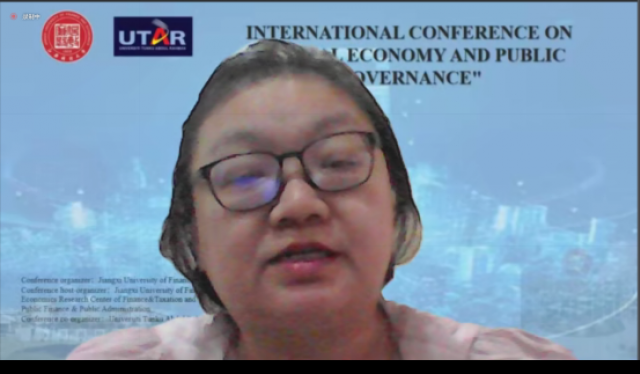 Dean Au Yong...
Dean Au Yong...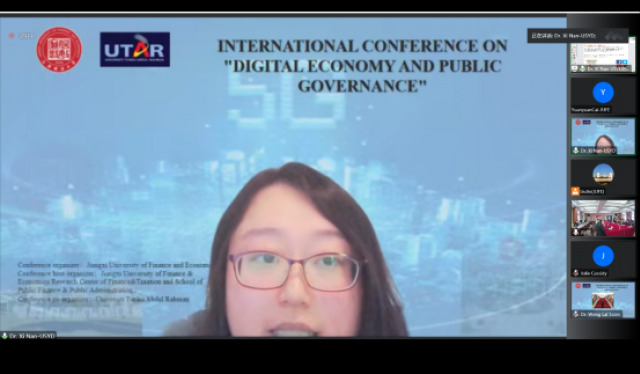 Dr. Xi Nan d...
Dr. Xi Nan d...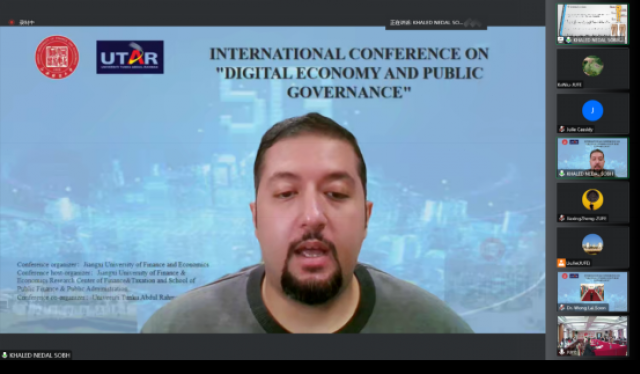 Engineer Kha...
Engineer Kha...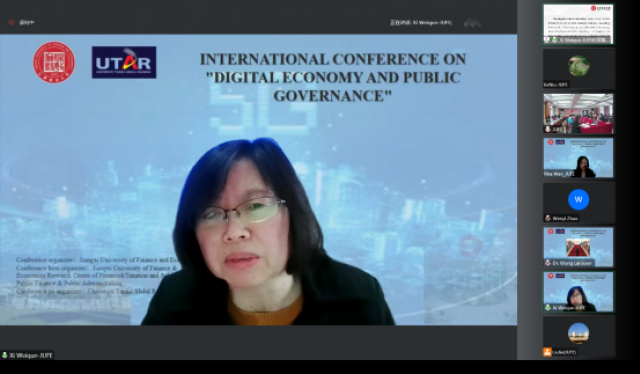 Professor Xi...
Professor Xi...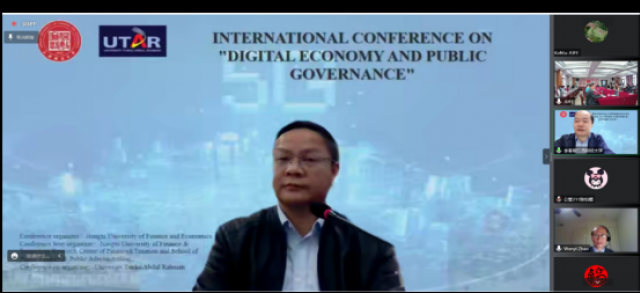 Internationa...
Internationa...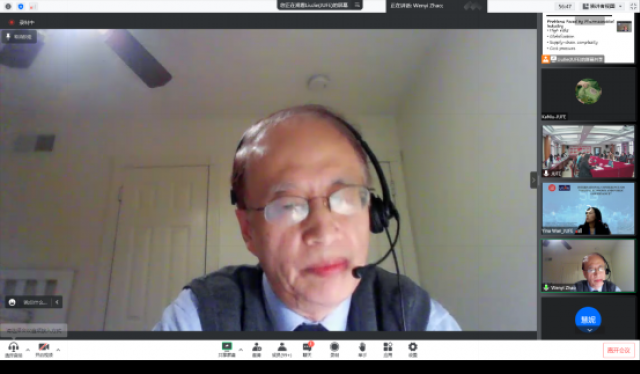 Sr. Research...
Sr. Research...